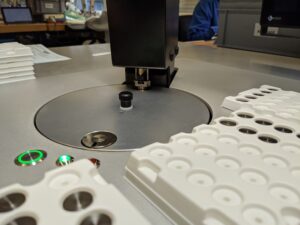Extremely slim, at times discreet and at others fully in view, the barrel spring (mainspring) is a component requiring the most demanding and meticulous care. The Biel/Bienne-based company Générale Ressorts has been specialising in this field and sharing its expertise with the the watch industry for 150 years.

Générale Ressorts employs over 70 people who work with extreme dexterity. Over the last three years, the firm has doubled its turnover and almost doubled its staff. It is a key watch industry player with more than 10,000 active references, 150 new creations per year and around 30 micromechanical and micro precision operations per reference.
A unifying history
Born from the merger of several mainspring developers, the oldest of which was founded in 1857, Générale Ressorts came into being during the quartz crisis, at a time when there were about ten active spring manufacturers who decided to join forces to survive.
The business was acquired by the Acrotec group in 2009 and has since benefited from the know-how of its sister companies. Production is no longer confined to just the spring, but encompasses the complete barrel. “The synergies between the group’s various skills lie mainly in the manufacture of components, as several companies are real specialists in bar turning. This approach offers us advantages in terms of communication, deadlines, flexibility, responsiveness, etc.”, says Alberto Sicco, Chief Operations Officer of the Biel/Bienne site.
The need to provide a complete service became essential, as Générale Ressorts was one of the first companies to offer a function in its entirety rather than just a component. As the COO explains: “Our company was visionary in this approach. Like any change in an industry, it took time to become embedded in people’s minds. Today, the complete barrel is our first product.”
State-of-the-art expertise
In view of the growing complexity of Manufacture-made calibres, watch brands are increasingly producing in-house movements. In step with this evolution, the number of references provided by Générale Ressorts has considerably increased. The company has the know-how and the expertise enabling it to do far more than merely execute a plan. It makes the necessary modifications (technical as well as aesthetic), however subtle they may be, whether for a large series or for a small series meeting the criteria of the Poinçon de Genève quality hallmark. “When a particularly demanding project is presented, we ensure we have the means to achieve the objectives in order to widen our range of skills even further”, says Alberto Sicco.
From project to realisation
When Générale Ressorts receives requests for estimates including plans, the first step is to analyse the feasibility of the project. This starts with a simulation of the spring using an in-house algorithm. This is followed by careful analysis of the plans of bar-turned components. Générale Ressorts conducts this study to ensure that the final function of the mainspring or the complete barrel is guaranteed (friction, cover retention during impact tests, etc.). “A complete barrel is worth more than the sum of its parts because of our expertise that it it includes. Throughout the process, we apply quality controls that save the customer from having to carry them out later”, explained Alberto Sicco.
Method
As the company has evolved, Générale Ressorts has documented and formalised all the operations necessary for the construction of the various references. When the operator receives a manufacturing order, the data is accompanied by a technical sheet detailing each successive operation. The expertise is thus linked to the company’s skills and no longer to those of a given employee. These operational procedures also enable the rapid onboarding of new personnel.
In order to strengthen its staff, the company also works with the Battenberg Foundation in Biel/Bienne. As some operations are repetitive and accessible, Générale Ressorts offers positions to people in a process of professional reintegration. It also takes on trainees, mainly from regional technical schools.
Nivaflex and Bioflex
Since the 1960s and 1970s, the production of barrel springs has been based on the use of Nivaflex. While this alloy boasts excellent properties, it also has certain risks. Firstly, the fact that there is only one manufacturer worldwide – in Germany – which supplies the entire Swiss watch industry is itself a potential threat to continuity of supply. This material is also composed of beryllium, a material not currently subject to any REACH regulations, but nonetheless a topic of fierce debate, meaning that restrictions or even a long-term ban on use cannot be entirely ruled out.
In order to overcome these problems and to improve the performance of mainsprings, Générale Ressorts has developed and patented Bioflex, a material that does not contain any material likely to be banned at some point. This alloy has demonstrated superior mechanical performance to Nivaflex, with the direct effect of optimising the power reserve and chronometric (precision timekeeping) performance of the timepiece. Since its first appearance on the market a few years ago, Bioflex has benefited from two years of additional studies in order to strengthen, secure and ensure its industrialisation, in small and large series.
Currently on track with the construction of a new assembly workshop, Générale Ressorts is expanding and preparing itself to respond positively to future demands. This growth perspective – also reected in the acquisition of a new machine for the automatic assembly of complete barrels at PetitPierre – testifies to its unquenched desire to continue innovating and pushing existing limits.
To read the full article, click here.
